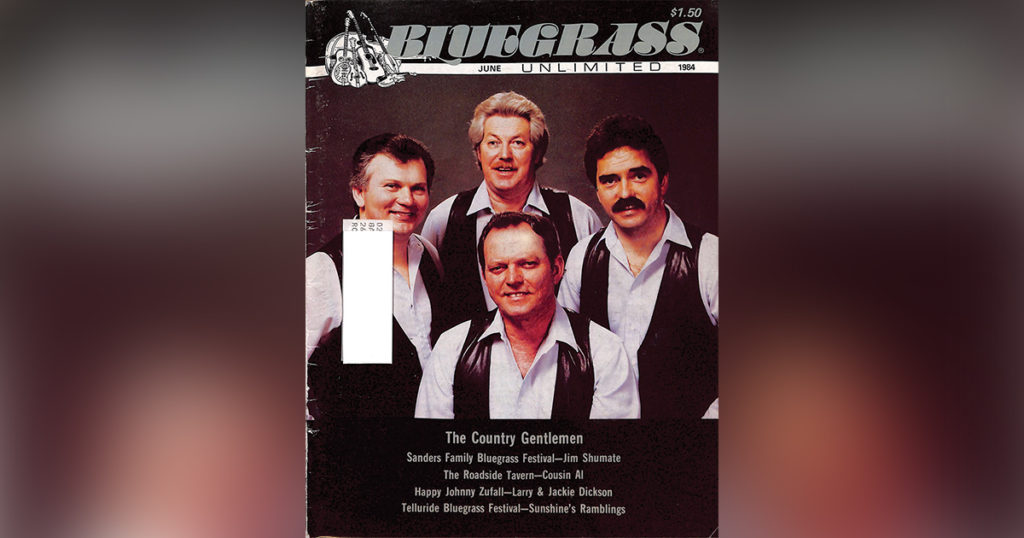Home > Articles > The Archives > The Country Gentleman—In The Truest Sense
The Country Gentleman—In The Truest Sense
Reprinted from Bluegrass Unlimited Magazine
June 1984, Volume 18, Number 12
Good as Gold and fine as diamonds, worth its weight in waiting for …” The sounds that ring through the capacity-filled hall are familiar to the cheering fans. The sounds have been produced, recorded, and enjoyed for over 26 years. There have been several changes in the sound over the years, yet there are three factors which still remain; the lead singer, the finest musicians and performers surrounding him, and the sound itself. There is no mistaking it.
Today, with the overabundance of bands on the scene, all too often “luxuries” such as originality, true professionalism on and off stage, exemplary talent and consistently quality music are neglected. Fortunately, for the fans, there are a few groups who have been successful in providing quality music over the years. However, the number of bands who have achieved each of the above is far fewer. There are no more than a couple of groups that deserve to be placed in this category and undoubtedly the Country Gentlemen are the undisputed leaders of the elite list.
Over the years, the voices of Doyle Lawson, John Duffey, Ricky Skaggs and Eddie Adcock along with many others have blended to provide this distinct sound. Along with the personnel involved in producing the sounds of the Country Gentlemen, another important factor has been the type of music they’ve performed. They have never been known for playing traditional bluegrass music, and although they may have been content with their sound, they were never reluctant to make changes. From the sixties and seventies when the Gents recorded works by such authors as Bob Dylan, John Prine and Gordon Lightfoot to their most recent album “Good As Gold” in which the material is forcing country critics and fans alike to take notice of the group’s talent.
The Country Gentlemen are true innovators who have achieved the feat of producing only the finest music performed by truly professional musicians for 26 years. The names of past Gents would fill a veritable who’s who of bluegrass music and yet the four men who form the group today produce, perhaps, the finest sounds the group ever had.
Playing banjo and singing baritone is Dick Smith who joined the group in November, 1981. At the same time the Gents welcomed mandolin-playing, tenor-singing Jimmy Gaudreau back to the group after a ten year absence, during which time he enjoyed widespread success with several groups of his own. On the bass, as he has been for the past fourteen years, is Bill Yates, a driving force in the Gentlemen organization. At the helm since the very beginning is the ever-present Charlie Waller.
The Country Gentlemen are known world wide as an exemplary force in bluegrass music. The stories of the performers have been told time and time again; however, the story of the men behind the images reflected on stage is one often neglected. Not only the private lives of the performers themselves, but also some of the people behind the scenes who form an integral part of the Country Gentlemen.
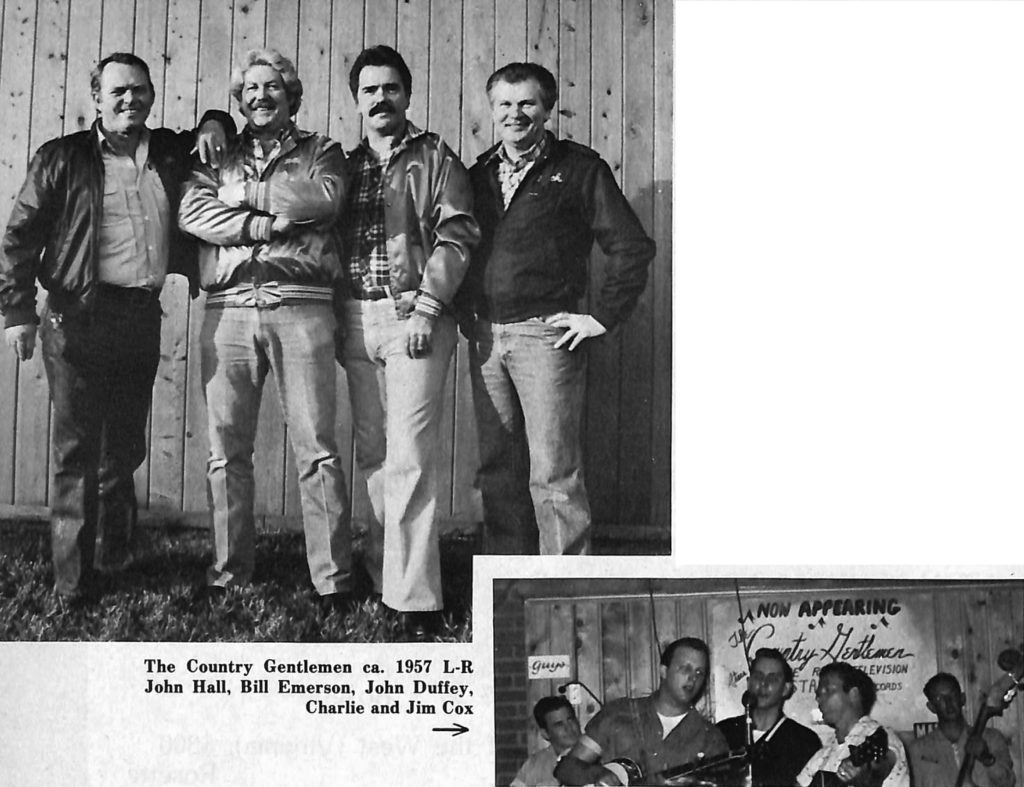
The men who make up the group are multi-faceted people who have given their lives to music, however music is not their life. They have accomplished much through their talent, but to coin an old phrase: “Success hasn’t spoiled them.”
To quote Charlie Waller: “If you have everything that goes with a beautiful day, then you’re rich.” And this so characterizes the man voted Best Bluegrass Singer each year of the award’s existence.
By many standards, Charlie would be considered uneducated since he only attended school through the tenth grade; however, his outlook on life and his insight to happiness is much greater than book knowledge. He admits, though, that sometimes he regrets not finishing his education, but looking back he remembers that his music would not allow him to finish.
As a young man, music ruled Charlie’s life and nearly ruined it. He quit school, lost jobs and girlfriends because of music. He would work all day, drive home in his ’37 Plymouth, play his guitar until early morning and then sleep a couple of hours before the next day’s work would begin. Obviously, he could not continue this way. Something had to go, so he quit the job. Once, later in his life he didn’t quit his job until after a near fatal car wreck convinced him that music was a full-time task.
Since the beginning, when Charlie isn’t playing music, he likes being by himself in the outdoors. He has a cabin which he and some friends built in the mountains near his home in Gordonsville, Virginia.
“Earlier in my career, my home life suffered due to the struggle I was experiencing with the band. I feel that this caused strained relations with my kids. It didn’t mean I loved them any less. We just had a hard time making ends meet. Now that the group is well established, life at home is easier so I’m determined to be closer to Mina.”
“I don’t eat, sleep and breathe music,” says Waller. “If I did, I would probably be better, but I would also miss a lot that life has to offer. I see mine as an Andy Griffith type lifestyle. I really look forward to doing a lot of things that other people consider to be work. I enjoy raking leaves or throwing the chain saw in the back of the Jeep, going up to the cabin and cutting down a tree or chopping firewood. A lot of people can’t understand that.
“If something ever happened that I couldn’t play music,” Charlie continues, “I think I would do something crafty…I love to work with my hands, as a kid I made a lot of models, so I think I would do woodworking or something like that.”
Most people think of entertainers as being socialites and constant partiers; however, Charlie is a self-proclaimed loner. “I enjoy being around people but I’m not very good at it. Music has always been my way of communication,” he adds. “In school I was voted most talented, so all of my life music has helped me. I can sing a lot easier to someone than I could talk to them. I think music is a feeling. I’m fortunate in that I can sing a song and touch people. It’s a God-given talent.”
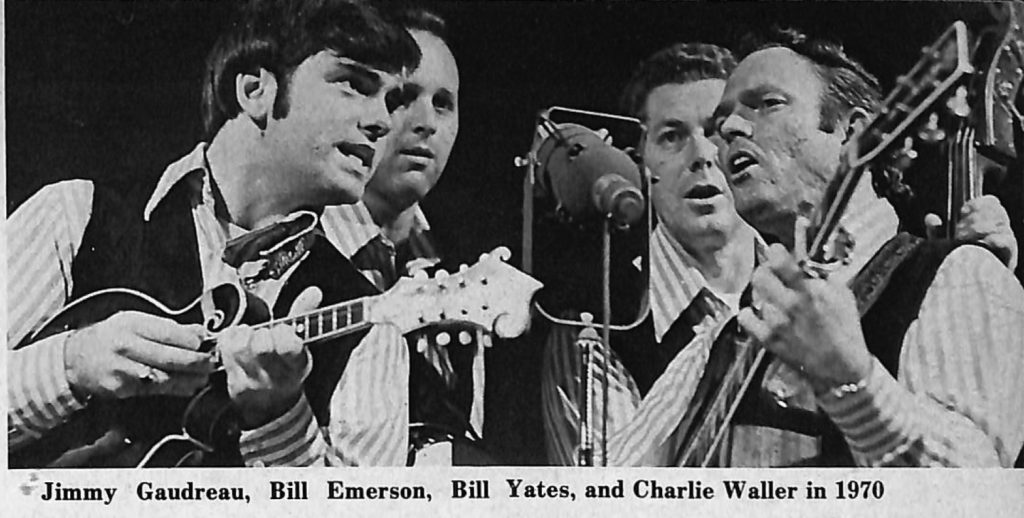
His is a talent that he has utilized to its fullest. In bluegrass realms he has accomplished almost everything possible; however, he still has a few remaining goals that haven’t been reached. “I’d love to have a hit record, but we’re not gonna make a big change in our music to get one. If we like a song we’ll do it, that’s it. The Country Gentlemen have never been limited by any boundaries and I think if we could get the necessary radio airplay, we could get our hit record. The new album, “Good As Gold,” I feel is one of our strongest releases ever, and it’s •strange for me to feel that way because, I guess, you’re your own worst critic. But I enjoy hearing it, and we’re getting good reviews on it. I think it’s got a good chance. I hope I’m right.”
It seems inevitable that a great artist is never fully recognized for his accomplishments until after he’s gone and Charlie realizes this. “I think good old- time country music will never die. It’s sincere and the people like it. I would, however, like to see glory for the things we’ve done before I pass away. I know what’s gonna happen, though, it’s inevitable. Even if I do see it, it will mainly happen after I go.”
The reason is that there simply weren’t that many people like Charlie before Charlie, and he realizes that he is simply making an easier road for up and coming bands. The thing that has kept him going all of these years is the feeling he gets from songs. “It started in the very early days,” Waller reminisces. “I would hear a song and chill bumps would just pop up on me and sometimes it still happens. I still love performing. I’ve been careful not to let music get too big in my life because I knew I would be doing it for a long time. I remember as a child I saw an old Roy Acuff movie in which he and a band was traveling all over the country in a bus and from that time on I knew that was what I wanted to do. So obviously music has been an ambition all of my life and I really don’t see myself retiring any time in the near future. As long as I can still find the desire to sing and feel that magic on stage and get goose bumps on songs. I’ll be singing as long as I’m physically able. Of course you never know what might happen,” he continues. “My philosphy is ‘Hope for the best, prepare for the worst, and take what comes.”
Behind every great team is a catalyst. There must always be a main link which seems to do more than his part to hold the group together. Bill Yates is that link in the Country Gentlemen. Since his debut with the band in December, 1969, Bill has been a true catalyst. His talents are many-fold. On stage, of course, Bill plays bass and sings baritone, bass or lead on many gospel songs. “I love gospel music,” Bill attests. “Since my childhood days back in Big Rock, Virginia when we’d have gospel sings, I’ve loved hearing and singing gospel music. I think bluegrass gospel is at the height of its popularity. It seems everyone enjoys hearing it.”
Bill’s duties don’t end after a show. He stays busy doing things that need to be done. “I’m not a lazy person,” Bill says. “I like to stay busy and there is always something to be done.”
Bill used to have to drive the bus full-time which presented an almost insurmountable handicap. It was a great strain to drive to a show, perform and then once again steer the coach to the next show. Now, however, Bill only drives when the group’s regular driver cannot make a trip.
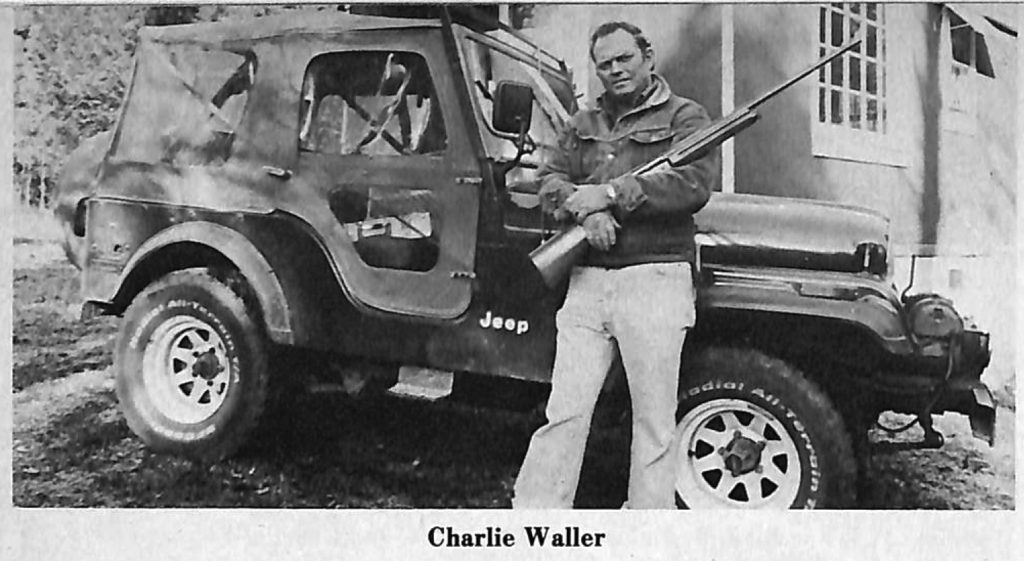
Music is deeply embedded in Bill. Before he joined the Country Gentlemen, he performed as one of Jimmy Martin’s Sunny Mountain Boys as well as Bill Monroe’s Blue Grass Boys. “A big difference in working with those bands and the Gents is that with them you’re a backup musician to a lead singer and here you’re a band member. We all realize that Charlie is the main man; however, since July, 1957 he chose to name the band Country Gentle-“men” not “man” and that’s the way we are. Everyone is important. Dick isn’t just a banjo player and Jimmy isn’t just a mandolin player. Everyone is an integral part of the group.
“I think the Gents are destined for something bigger and we are capable of reaching it. We’ll always do the music that we are recognized for, and yet at the same time I think we can expand our horizon a little. We’ve got two important factors on our side. First, we have a lot of good friends and loyal fans who will stick by us even if we went a little more commercial; so we could only gain more new fans while not losing our present ones. Secondly, we have an ace-in-the-hole in Charlie. No matter what music we do, people will recognize us. Even if we were to employ a steel guitar or electric guitar, not to say that we are going to, but if we did, as soon as Charlie started singing, people would know it was the Country Gentlemen. Charlie is the best singer in bluegrass and he can compete with anybody in Nashville’s country music and it’s a shame that more people can’t hear him.
“It’s hard for a bluegrass band to make it outside of the bluegrass realm especially without going commercial. I think people expect us to do a little different type of music and we have. We’ve never been a traditional bluegrass band. After all, we’re the Country Gentlemen — not the Bluegrass Gentlemen. You know a lot of traditional music sounds the same. Ralph Stanley’s and Monroe’s voices are pretty distinctive but other than that a lot of it sounds alike. But how many bands sound like the Country Gentlemen? Not many, if any.”
Although music is obviously very important to Bill, he also has other interests. He, along with Mary Lou, his wife of eight years, has a trailer near the beach in Sandbridge, Va. where, among other things, he enjoys fishing. “I like to do about anything outdoors except hunting,” Bill explains, “its dangerous enough on the streets without getting in the woods where guns are legal. I like being outdoors though. Every chance we get we like to go down to the trailer and just take it easy. I like to do mechanical work on cars or maybe the bus now and then. I’m rebuilding a Thunderbird now and doing all the work on it. It’ll take awhile but it keeps me busy.”
Bill, who has been playing professionally for 23 years has no immediate plans for retirement. “I really don’t know when I’ll quit playing professionally. Bill Monroe is 72 years old and he’s still going strong. So who knows?
“In looking back over my career, I don’t know if I would have been able to stay in music as long as I have if I hadn’t gotten into an organization like the Country Gentlemen. I’ve been a partner with Charlie since ’71, so I feel like I’m not just working. I’m working for something. And that working has been made easier by the fact that we are a band of equals; nobody’s a sideman. We are the Country Gentlemen.”
After fifteen years of professional picking and singing, Jimmy Gaudreau has undergone a lot of changes but his love for music still remains. One reason for this would be his outlook on the business. “I’m very competitive by nature,” Gaudreau says. “I always have been, from my childhood days in sports to early in my music career until now, with the Country Gentlemen. You have to have that drive. You can’t survive without it.”
Gaudreau found an early interest in music. At the age of nine he began playing guitar and later mandolin and banjo. In 1966, Jimmy had his first job in bluegrass with Bill Rawlings and the Twin River Boys. Three years later he accepted the chance to play with the Gentlemen after John Duffey’s departure. For a young musician to be thrust into this position as a relative newcomer would be too much for many to handle; however, Jimmy made the most of the opportunity and he shined.
His style of mandolin is very distinctive. “I never tried to copy anyone,” Jimmy explains. “I don’t listen to fiddle players for that very reason. I don’t want to find myself copying their licks. I will, however, listen to a steel guitar or guitar and transpose some licks onto the mandolin. Early in the sixties, I had a rock and roll band called “Jimmy G and the Jaguars” in which I played electric lead guitar. This gave me a lot of insight to licks I now play on mandolin.”
In the early seventies, Jimmy left the Gentlemen to form the II Generation with Eddie Adcock. From here he played stints with Country Store, J.D. Crowe and Spectrum. In 1981 he returned to the D.C. area-based Country Gentlemen.
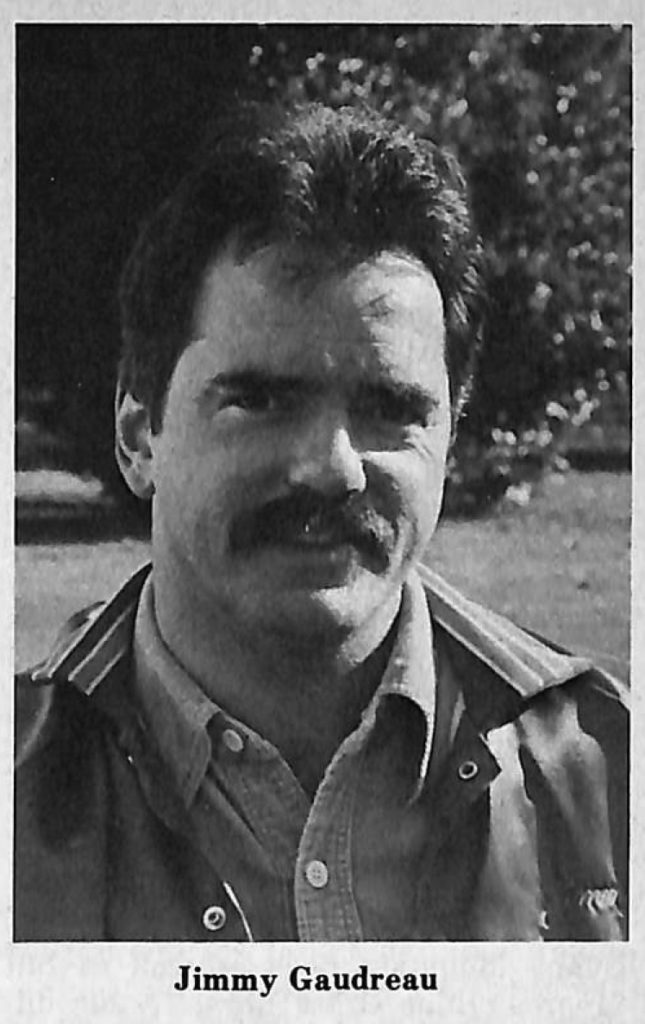
This in itself instigated some changes for Jimmy. “I was living in Kentucky for the first year and commuting by plane or car so it was pretty tough,” Gaudreau remembers. “When I sold my home in Lexington, I decided to buy a house in the immediate D.C. area. While off of the road, I enjoy a relatively slow lifestyle which I found in Warrenton, Virginia.”
While at home, Jimmy enjoys a wide variety of pastimes, his favorite of which is cooking. “During the summer months while I was in high school, back in Rhode Island, I worked in a restaurant, so this is where I got my first experiences in cooking. I like to have friends over and cook dinner for them as well as going out with friends to a nice restaurant. I thoroughly enjoy good food. Maybe later in life,” Jimmy continues, “if I for some reason could not play music for a living, I might consider opening a restaurant, but I have no immediate plans for a change in my career.”
For many musicians, the years on the road is too much to take; however, Jimmy still enjoys it. “Some shows go better than others, which is natural, but I still enjoy each and every trip we take. I keep a suitcase packed all of the time. We travel so much, it would be useless not to. As long as I’m able to play and sing, I’m going to. Music would be extremely hard for me to replace in my life.”
Of being on stage Jimmy cites, “A musician should always be thinking very seriously about giving a good performance. A tenor singer lives in constant fear of waking up in the morning with bass tones. I have to allow a few hours before a show for my voice to raise back to its normal pitch. A musician has to be able to leave his personal problems behind him when he goes on stage. Sometimes this causes nervousness which is hard to overcome. One way to beat this nervousness is through humor.”
The Gentlemen are truly masters of humor whether they are on or off stage and whether they are executing a very obvious joke or a harmless prank. Some have become old standards yet some are previously unknown.
Since the days of John Duffey and Eddie Adcock, there has been an inside joke that could be titled “Who’s Been Sleeping in My Bed?” Since the beginning, Charlie has not been a night person. He’s usually the first to retire to bed for the night. After a show in the sixties, Charlie went to sleep in the back of their car leaving the driving to John and Eddie. Seeing the chance for a good trick, John steered the car to the back lot of a junkyard. From here John and Eddie walked to a hotel leaving an unsuspecting Charlie to wake up the next morning to figure out where he was and how he got there on his own.
A more modern version of this prank began just a matter of months ago while in Canada. Although 26 years have passed, Charlie is still the first to go to bed. Usually the last words heard from him in the front of the bus are, “I’ll be back in a second. I’ve got to check something.” When this is heard the rest of the Gents know they won’t see him until the next morning. Recently, on a return trip from Canada, Charlie announced he would be back for a nightcap after a trip to the restroom. A few minutes later he was heard sneaking up the hall of the bus to his bedroom (located at the front of the bus). So as not to be seen he did not turn on the light in his room. Maybe now he wishes he had. While trying to get the cover on his bed straight, he discovered that Dick had “made himself at home” under the covers.
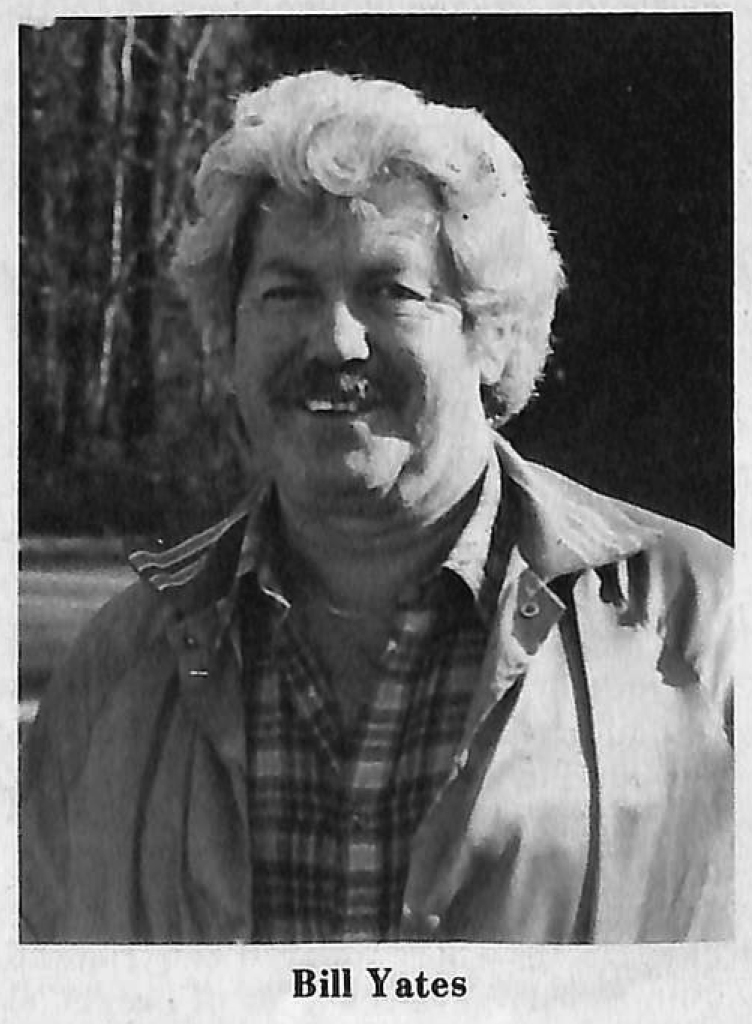
A couple of weeks later, after much ado, Dick convinced Charlie to stay around awhile, have a soda and chat. When Charlie returned from his room, Dick opened a drink and gave it to Charlie, who sat in the front seat and began to talk. After a few minutes of conversation, we noticed that Dick was no longer with us. He had gone to bed! Not to be outdone, Charlie and I proceeded to attack Dick in his room. The next hour was filled with laughs and good times.
Convinced the joke was finished, Charlie and I returned to the front of the bus. After a little more conversation Charlie went to bed. A few minutes later we heard laughter from Charlie’s room and then Charlie called, “Guess who I found in my bed?”
Jimmy’s brand of humor on the Gents began before his current tenure with the group. While a member of J.D. Crowe’s New South, Jimmy was performing at a concert before the Gentlemen. Backstage, Jimmy, who was known for carrying cigarette loads, asked Bill Yates if Doyle (Lawson) could take a joke. Bill assured Jimmy that he could. While the Gents were on stage, Jimmy took a pack of cigarettes from Doyle’s jacket, loaded one and returned the pack to its rightful place.
After the show, the performers were socializing backstage. Doyle, who was smoking, was talking with Jimmy when Bill Yates walked up to bum a cigarette from Doyle. Sure enough, Bill got the loaded one. In a few puffs … Bang! Several reactions filled the room. Bill, of course, was startled, Doyle was afraid Bill was gonna kill him thinking he had loaded it. Finally Bill remembered Jimmy’s earlier question and realized that the joke had been successful, just not on the right person!
Some years later, Jimmy pulled the same prank on the Gent’s record man, John Patina. The only difference was that Jimmy loaded two random cigarettes, one of which Jimmy immediately set off. The other one wasn’t heard from until hours later when John was haggling with a restaurant cashier over a discrepancy on his check. During the course of their conversation, John lit one up. Needless to say, he once again found the loaded one.
Although humor is obviously very important to Jimmy, he also has a very serious side; especially when speaking of changes he’d like to see take place in bluegrass music. Jimmy explains: “I love bluegrass and don’t mean to offend anyone, but I’m afraid bluegrass is gonna be in a lot of trouble as long as there are radio stations that don’t screen the music that they play a little bit closer. There are DJs on the air right now that are guilty of playing anything that is sent to them; so quality music is suffering because of the non-quality or lesser- quality music being played. In order for bluegrass entertainers to gain more recognition, we have to be able to compete with the country music of today, and the reason that country music is so popular is because stations screen out the stuff that can’t cut it, and all they play is music by quality singers and musicians. You may term it as formula music, but let’s face it, the formula works and people en masse listen to it.
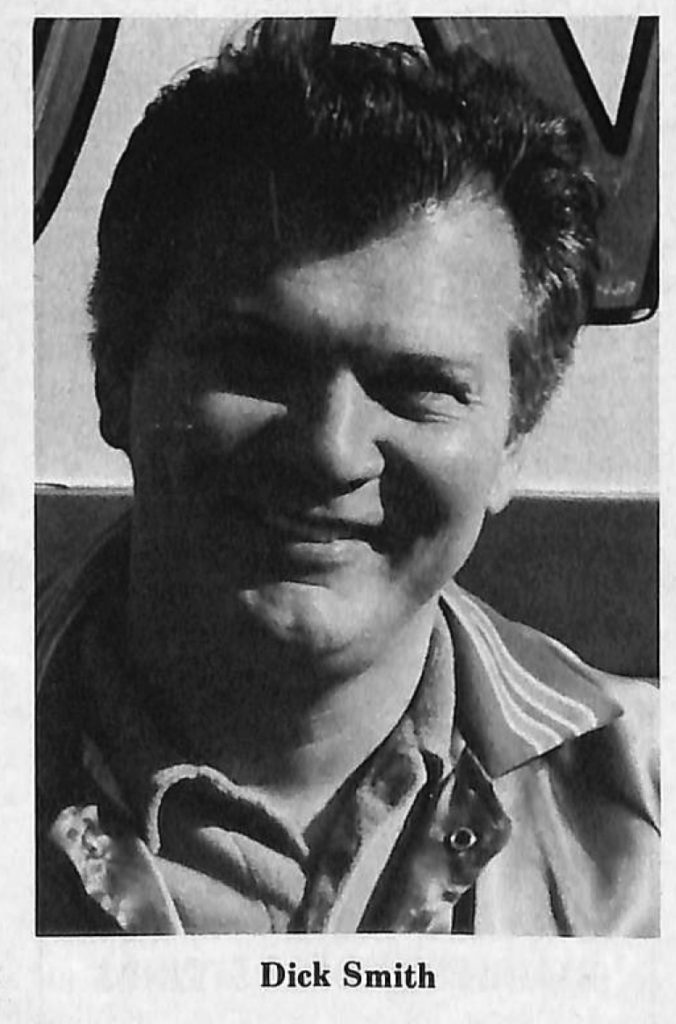
“I realize,” Jimmy continues, “that new groups starting out feel slighted when after going to the trouble of making a record, the radio stations won’t play it. They must, however, take into account the listening audience. Who wants to hear something that really should not be on the air at all played back to back to a Tony Rice record, for example. It seems that anyone can go out and cut a record these days and somewhere there’s someone that will give it airplay, and that is really too bad. From this, first time listeners will base an opinion that some of the music is good but a lot of it is bad. If a station had a board of listeners to select the music before it’s ever played, then it would tend to create higher quality music that is easier to listen to.
“This is the change I think needs to be made and the sooner that that gets done, the better off this music’s gonna be. There is enough high quality music out there to program it constantly and not make it boring by any means. The bottom line is: ‘Keep the standard high’.”
In any group, although the lead singer is often considered to be the most important, the backup musicians are imperative. Dick Smith, the banjo player for the Gentlemen since November, 1981, is an especially good team member. He explains: “I feel it’s important to be a good backup musician, for without it the lead singer can’t perform to his fullest. It’s like an actor in a movie; it would be impossible for a leading actor to win an Oscar without a good supporting cast. The same is true in music. A band needs a strong group effort before it can really put together a good performance, and in the Country Gentlemen every member is important and made to feel that way.”
Since many people consider the banjo to be the bluegrass instrument, many banjo players desire the limelight. Dick, however, feels differently. He continues: “I’m contented to be a side man, it’s very interesting. Every show I am concerned with how I can best enhance the sound of the group, whether Charlie is doing a lead vocal, or a gospel trio, or another instrument is taking a lead break. I enjoy taking breaks but I get very involved in trying to fill in the space behind the vocals. Jimmy and I work well together. It seems we can read each other and know when the other is going to fill in. We make a good team.”
Dick, who lives in Woodbridge, Va., has been playing music since he was fifteen. He began playing professionally with his brother, Bill, as the Smith Brothers. “I can’t remember not listening to bluegrass music,” Dick recalls. “I always liked it and became interested in it, initally, because I wanted to find out if I could make those sounds that I heard on record.
“My first full-time job in music,” Dick continues, “was with Country Store. From there I played with Nightsun and then short stints with several other bands. I worked with Del McCoury for about five years before joining the Gentlemen.
“When I first started playing music, I decided I didn’t care how good I got, I simply wanted to play. The reason for this was I knew I had all of my life to play music and I figured that as long as I could play I would do it just for enjoyment. As I became further involved in music, I saw that I was progressing faster than I ever thought I could so I kept trying to learn new things.
“I never really tried to copy anyone,” Dick remembers, “and I listened to a lot of different banjo players; but I especially liked to listen to Earl Scruggs, Don Reno and Sonny Osborne. As I began playing more seriously, I started to listen to myself more objectively. I found that I was doing my solo breaks fine but I needed to concentrate more on my backup work. Earl Scruggs was a master of backup and I think I learned a lot of things by listening to him.”
When he’s not playing music, Dick also enjoys working with his hands. “I love to work with quality materials or try to restore quality back to something, whether it’s a musical instrument, a piece of furniture or something else I’ve taken an interest in. I like to make useful thing’s out of non-useful things. I also enjoy working with pearl and doing instrument inlay.”
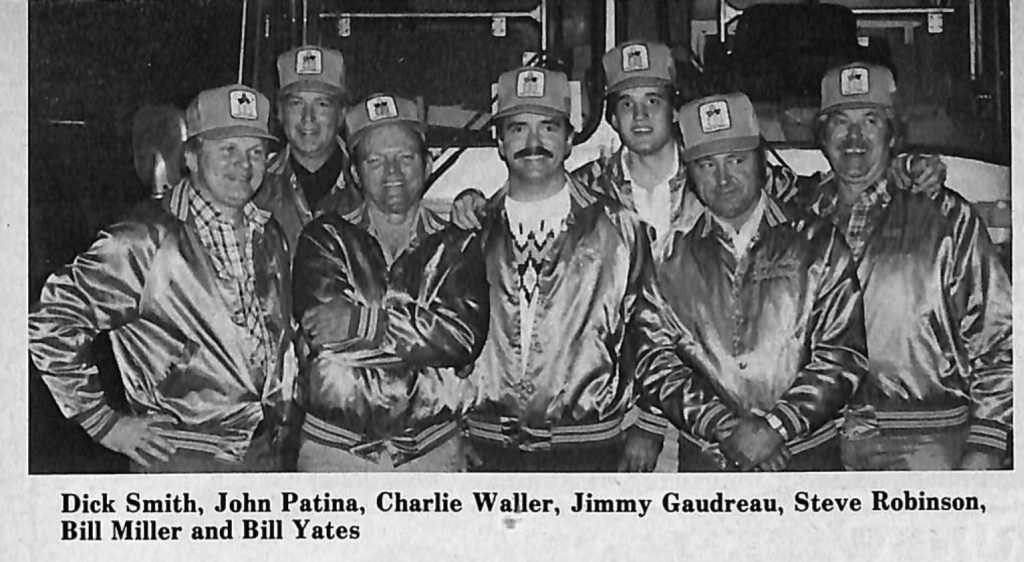
Craftsmanship is one of Dick’s strong points; however, music is still his first love. “As long as I’m able,” he points out, “I want to play music. I have no plans to retire as long as I’m physically able to travel and perform. I promised myself a long time ago that I would play music until it became too much work. Music has always been my favorite hobby and I never want to ruin that. There are banjo players and there are musicians. I work to be a musician as opposed to just a banjo player. The difference is a banjo player just plays the song while a musician expresses his feeling in his interpretation of the song being played. I try to complement the lead singer as best I can and see what happens.
Every group, whether full-or part-time needs someone to handle its business and book shows. On Labor Day of 1971, Len Holsclaw agreed to book shows for the Gentlemen and shortly thereafter formed the Lendel Agency, exclusive management for the Country Gentlemen.
The beginning of this career was marred with a potential disaster. Eddie Adcock left the group and took Jimmy Gaudreau with him to form the II Generation. Many felt this would be the downfall of the Gents, but instead this allowed Doyle Lawson and Bill Emerson to join Waller and Yates to form the group considered by many to be one of the best bluegrass bands ever.
“Originally,” Len remembers, “it started with the understanding that I would only do the booking for the band; but it began to grow and grow and soon the Country Gentlemen became a relatively big business. In 1971 the group formed a corporation under Virginia laws. Presently I am the president,
Charlie is vice president and Bill Yates is Secretary-Treasurer. This, however, is a little misleading because anyone who is a Country Gentlemen works for Charlie Waller. We all work to augment him and his music. There is no doubt that he is the Country Gentlemen. We run like any normal business, everyone draws salary checks from the corporation. Presently,” Len continues, “my wife, Katherine, and I are the business managers of the corporation as well as booking shows for the band.
“At the time I signed on to work with the Gents, I was a sergeant on the Arlington Co. [Virginia] Police force and last year I retired as Chief of Investigation in the same department. I don’t know which was the part-time job. You know the two jobs are so different, but I think both were good vocations. Some of the operational procedures involved in the police department helped me in some of the business aspects of music and in the same respect, the music business helped me in my governmental work. However, all of those years I was careful not to let one job overlap to another.
“I’m pleased,” Len continues, “because we—as a team—have taken a group that was working three nights a week in a small club in Washington, D.C. for a very low fee and brought it to a world-wide acclaimed group playing 150 to 175 dates a year. We’ve achieved a financial and artistic status that we are very proud of. When a promoter books the Gents, he knows he can depend on them to be there. In thirteen years the band has missed only one date that was their fault. I dare say that is a feat few other bands can boast of.
“We’ve gone from traveling in cars to touring the country in a Silver Eagle bus that has been Pullmanized with four private bedrooms, a bathroom, a microwave oven and T.V. It has all of the comforts of home and does its part to make life on the road a lot easier. We’re not rich by any means although we’ve achieved a status that we’re satisfied with; but you can never quit trying. The Country Gentlemen have made their mark on bluegrass music but we still have aspirations to get Charlie Waller the acclaim that he deserves. This may involve some changes but we feel that the future is very bright for the Gents.
“It’s been a great thirteen years and a great affiliation,” Len recalls. “To the best of my recollection, we have never had an argument. Of course we’ve had disagreements but never anything serious. We’ve gone through a lot together: personal tragedies and problems as well as good times and we’ve stayed together through it all. Some may suggest that we’ve depended too much on fate and luck when we should have depended on computer programs and the like; but we’ve come this far all by ourselves so I guess we’ll make it the rest of the way.”
No doubt, they will. On or off stage, the Country Gentlemen are gentlemen … in the truest sense.
